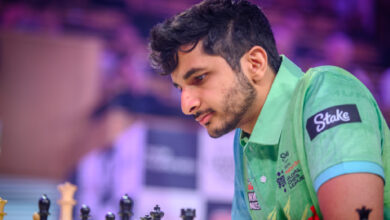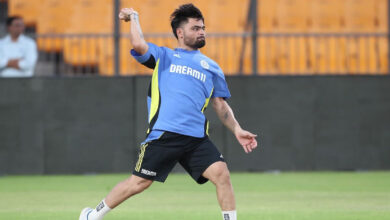Hikaru Nakamura interview: ‘(Indian players) seem very motivated and hungry… not satisfied with where they’re at’ | Chess News

Hikaru Nakamura has no hesitation in revealing who he will be “rooting for” when 18-year-old D Gukesh bids to become the youngest world champion in hory beating holder Ding Liren from China next month in Singapore.“I’d probably be beyond disappointed if he (Gukesh) doesn’t win the World Championship,” says Hikaru, before going on to explain the upside to the Indian teenager’s victory for the world of chess.
The World No 2 also spoke admiringly about the support that India’s big three are getting from private sponsors which he was lacking even after establishing himself as an elite Grandmaster.
In a freewheeling interview with The Indian Express on the sidelines of the Global Chess League, the ‘icon’ player of the American Gambits spoke at length on why he believes that ‘sky is the limit for Indian stars’, why he enjoys playing in formats like the one being used at Global Chess League, and more.
Excerpts:
We saw the way the Indian team played at the Chess Olympiad. What did you make of India’s performance?
The bottom line is, when you look at the players, very specifically, Arjun (Erigaisi) and Gukesh, they seem very motivated. They’re very hungry. They’re not satisfied with where they’re at. That’s perhaps one of the differences. Maybe, it’s not system-specific, but certainly when it comes to sponsorship, the system and the number of people they have around them, plays a huge role in terms of the ability to stay hungry and focus on chess. If I were to just use myself as an example, when I came up in the US, and even when I had crossed my 2700 rating, I never had any kind of sponsorship that was on the level of what say Arjun, Gukesh or Praggnanandhaa are getting right now. So from my perspective, once you broke into the top 10, or at least when I did, the goal was to kind of maintain your ranking and just make sure you make the income. The fact that you have the big 3 in India (Gukesh, Arjun and Praggnanandhaa) who are very much solidified, with this very serious support from private individuals and corporations, makes a huge difference in that they’re not complacent. Hence, they’re able to just focus on going all out, trying to play their best chess. Using myself as an example, now that I’ve had such success in making content (Nakamura is one of the world’s foremost chess streamers on platforms like YouTube, Twitch and Kick), that has actually taken a lot of the pressure off of me. So when I play chess, I enjoy it much more than I did back when I was a pro player. A lot of the top Indian players specifically, now that they have that support, are able to actually enjoy chess. They can play chess and try to achieve the optimal results, versus having to worry about making a living. And sky’s the limit, really, for all three of them.
American Gambits’ Hikaru Nakamura in action in the 2024 Global Chess League. (FIDE | Michal Walusza)
I certainly expect Gukesh to win the world championship next month. I’d probably be beyond disappointed if he doesn’t win it, simply because when I look at chess hory, I can’t really see any upside to a Ding Liren victory, whereas, certainly in India, chess is very hot right now. So if Gukesh wins, it will become bigger. So, I’m actually definitely rooting for Gukesh to win the match against Ding. But whether it’s him or Arjun, all of them are playing great chess right now, and I would say that the future is extremely bright in India.
Do you see a future where two Indians are playing against each other in the World Championship?
I’ve seen a lot of people on the internet say things and they talk about how other countries are going to have top players (emerging), and India has only these three players right now. But for me, the thing that’s really quite different is that when you look at the second level, below the top three, a lot of very strong players – like Raunak Sadhwani, Nihal Sarin, Aravindh Chithambaram… there’s a lot of these kids like M Pranesh who are in the 2650-2680 rating range. I expect at least one or two of them to break through eventually. So there’s a very high chance that you could have a World Championship between two Indian players in the future. It’s not unreasonable to think that you could have a Gukesh playing against Arjun or Gukesh playing versus Pragg, or one of these other kids who’s a little bit younger, breaking through. I don’t want to give a probability in terms of percentage, but there’s probably at least a 20 percent chance, in general, of two Indians playing for the world championship in probably the next decade or so.
How difficult is it to maintain that motivation to keep playing after you have reached a certain level and have accumulated success? At some point, does it get slightly harder to push yourself?
I’m the wrong person to answer that question. But what I would say is that, fortunately, as I’ve gotten older, chess has also changed quite a bit, and it’s a little bit easier to prepare for games nowadays. There’s so many more resources available, and so for that reason, I’m able to maintain my love to play. But also, I try to pick and choose tournaments. For certain tournaments, like this Global Chess League, I am quite motivated. But if it’s a tournament-specific situation, if I play a tournament in October, I play in December, or if there’s a bit of a break, it’s a lot easier to get motivated than say for playing on the Grand Chess Tour, where you play in April, June, July, August… you play all these events. When you start playing too many events, you lose motivation. You see the same faces, you get the same openings. It becomes very monotonous, very boring. So for myself, when I pick and choose tournaments these days, I look for tournaments that have sort of different formats, or something that’s not just the traditional nine-round round robin event like in, say the Sinquefield Cup specifically. As long as there’s a different format, maybe it’s fast games, or maybe as you play slow games but then there is an Armageddon, like in Norway Chess. As long as the format’s a little bit different than just the classical, different than just the boring classical nine-round tournament, I always enjoy playing. That’s actually the thing that keeps me motivated: just trying these tournaments that have these exciting new formats.
Gukesh, held on for a draw against Hikaru Nakamura in the final round of the prestigious Candidates chess tournament. The result was enough for him to secure a spot at the World Chess Championship. (FIDE/Maria Emelianova via Chess dot com)
Did things change also because of so many Indians breaking through? You suddenly had newer faces, newer people to play and try to beat, newer ideas on the board?
The big shift is a couple of things. First of all, you have a whole new audience coming into chess from the outside world. They either follow chess very casually, or almost not at all. And these days when you look at society, everything is moving a lot quicker than it used to. And at the end of the day, having games that go five or six hours, nobody is really willing to watch that anymore. You can even go back to the World Championships 25 or 30 years ago, where they played slow games for months on end. It’s a product of a lot of new people coming in who don’t watch or follow chess super- closely. Society is moving so much quicker: so in terms of an audience, the optimal amount of time that someone’s going to watch chess is, I would say, somewhere between 30 minutes to at the most one hour. So that’s why rapid and blitz are becoming more important. Whether they overtake classical chess remains to be seen. A lot of that probably depends on FIDE, and whether they want Magnus Carlsen to come back to playing the world championship cycle. If they really wanted him to try and become world champion again, they’re going to have to make a change. But if not, the World Championship cycle will remain in the classical format. But more and more rapid and blitz tournaments will play a bigger role outside of the World Championship.
Finally, what do you love about chess? What is the one thing that basically stands out more than anything else?
The thing that I like the most is probably the creative aspect, the fact that every game is quite different and you reach a new position, you always try to evaluate, calculate and reach the right conclusion. Of course, in slow games, it’s a little bit easier if you have more time than in fast games. But certainly the creativity and the originality that occurs in pretty much every game, for the most part, that’s what makes it fun to play.







